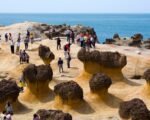Piura city faces water shortage and mosquito invasion
The city of Piura, located in the north of Peru, is facing a severe dengue outbreak that has affected more than 5,000 people and claimed several lives. The situation is worsened by the high temperatures and water scarcity caused by the El Niño weather phenomenon, which has created favorable conditions for the breeding of mosquitoes that transmit the disease.
Residents of Piura receive water for only half an hour a day, forcing them to store it in plastic tanks that become mosquito nests. The lack of air conditioning also drives people out of their homes, where they are exposed to the insect bites. “You go out to get some air and the mosquitoes arrive suddenly and attack you,” said Segundo Ramos, a driver who contracted dengue a few days ago.

Health emergency declared in most of Peru
The dengue outbreak in Piura is part of a larger epidemic that has affected most of Peru, with more than 34,000 cases reported in the first eight weeks of 2024, twice as many as in the same period last year, according to the health ministry. The government declared a health emergency in most of the provinces on Monday, in order to mobilize resources and personnel to contain the spread of the disease.
Dengue is a viral infection that causes fever, headache, muscle and joint pain, and in some cases, hemorrhagic complications that can be fatal. There is no specific treatment or vaccine for dengue, and the only way to prevent it is to avoid mosquito bites and eliminate their breeding sites.
Experts warn of El Niño effects on public health
The El Niño phenomenon, which occurs when the surface temperature of the Pacific Ocean rises above normal, has been linked to the increase of dengue cases in Peru, as it creates a warmer and wetter climate that favors the proliferation of mosquitoes. The World Health Organization (WHO) said that Peru’s 2023 dengue epidemic was related to the rains and heat brought by El Niño, especially in the northern regions of the country.
Experts warn that El Niño could also have other negative effects on public health, such as respiratory infections, skin diseases, food poisoning, and waterborne diseases. They recommend that people take preventive measures, such as drinking boiled or bottled water, washing hands frequently, avoiding exposure to the sun, and using repellents and mosquito nets.
Authorities struggle to control dengue outbreak
The authorities in Piura have set up special areas in hospitals to receive dengue patients, and have launched campaigns to fumigate and clean the streets and houses. However, they admit that they are overwhelmed by the magnitude of the outbreak, and that they face challenges such as the lack of awareness and cooperation from the population, the shortage of medical supplies and personnel, and the difficulty of accessing remote areas.
Health Minister César Vásquez acknowledged on Thursday that dengue “is not under control” and that the cases “will continue to grow.” He said that the government is working to strengthen the health system and coordinate with local authorities and communities to fight the disease. He also urged the public to seek medical attention if they have symptoms of dengue, and to avoid self-medication.








